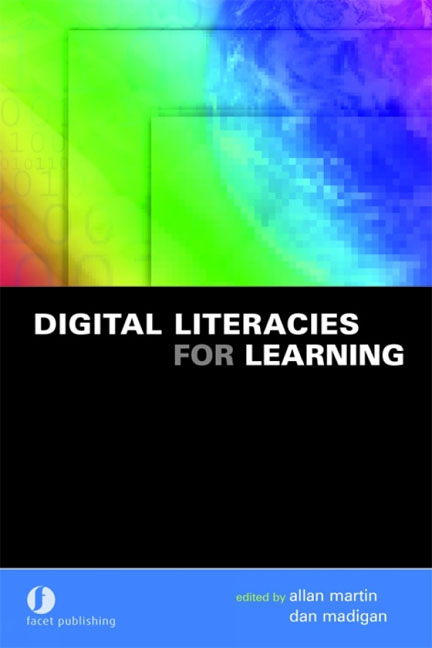Book contents
- Frontmatter
- Contents
- Dedication
- The contributors
- Foreword
- Preface
- Part I Literacies in the digital age
- Part II Enabling and supporting digital literacies
- 12 Supporting and enabling digital literacy in a global environment: preview of Part 2
- 13 A ‘dense symphony of the nation’: Cymru Ar-Lein and e-citizens and e-communities in Wales
- 14 The impact of information competencies on socio-economic development in Southern Hemisphere economies
- 15 Supporting students in e-learning
- 16 The information commons: a student-centred environment for IT and information literacy development
- 17 Socio-cultural approaches to literacy and subject knowledge development in learning management systems
- 18 Approaches to enabling digital literacies: successes and failures
- 19 Professional development and graduate students: approaches to technical and information competence
- 20 Windward in an asynchronous world: the Antiguan initiative, unanticipated pleasure of the distance learning revolution
- 21 A tale of two courses
- Index
19 - Professional development and graduate students: approaches to technical and information competence
from Part II - Enabling and supporting digital literacies
Published online by Cambridge University Press: 08 June 2018
- Frontmatter
- Contents
- Dedication
- The contributors
- Foreword
- Preface
- Part I Literacies in the digital age
- Part II Enabling and supporting digital literacies
- 12 Supporting and enabling digital literacy in a global environment: preview of Part 2
- 13 A ‘dense symphony of the nation’: Cymru Ar-Lein and e-citizens and e-communities in Wales
- 14 The impact of information competencies on socio-economic development in Southern Hemisphere economies
- 15 Supporting students in e-learning
- 16 The information commons: a student-centred environment for IT and information literacy development
- 17 Socio-cultural approaches to literacy and subject knowledge development in learning management systems
- 18 Approaches to enabling digital literacies: successes and failures
- 19 Professional development and graduate students: approaches to technical and information competence
- 20 Windward in an asynchronous world: the Antiguan initiative, unanticipated pleasure of the distance learning revolution
- 21 A tale of two courses
- Index
Summary
Abstract
In recent years, institutions of higher education have increasingly recognized and emphasized the importance of improving, through a variety of initiatives, students’ technical and information competence. The focus of these initiatives has generally been on undergraduate students and teaching faculty, not on graduate students. In their formal course work, graduate students concentrate on acquiring disciplinary knowledge and participating in disciplinary research. Relatively few opportunities exist for professional development activities designed to develop graduate students’ technical and information competence. To remedy the situation, institutions of higher education need to rely on approaches typically used by faculty development centres in order to reach graduate students. An interdisciplinary learning community model used at Bowling Green State University in Ohio is presented in this chapter.
Introduction
Most initiatives regarding technical and information competence focus on undergraduate students or faculty, not graduate students. This is unfortunate since most graduate students will become faculty members or will follow equally challenging career paths requiring a high level of competence in these areas. As such, graduate students need more access to professional development opportunities. Their future employers and students will only benefit from their improved skills.
In the USA, graduate student preparation has recently gained more attention since several important studies found a mismatch between graduate student education and the kind of work expected of students once they complete their degrees (Pruitt-Logan and Gaff, 2004, 177). One area commonly identified as needing greater attention is teaching, specifically teaching with technology. Increasingly, faculty are expected to apply innovative technological approaches to their teaching (Adams, 2002, 3–4). Relying on the expertise of staff at faculty development centres is one possible solution to this problem for colleges and universities. Faculty development centres are able to employ strategies they typically use with faculty to reach graduate students because graduate students are more like faculty members in training, not undergraduates. These strategies may include but are not limited to offering workshops, fostering campus partnerships, providing incentives for participation, and creating cohort-based or topic-based learning communities.
A professional development project incorporating a variety of approaches used by faculty development centres is the focus of this chapter. In an attempt to improve graduate student information and technical competence, the Center for Teaching Learning and Technology (CTLT) along with University Libraries (UL) at Bowling Green State University (BGSU) launched an experimental interdisciplinary learning community.
- Type
- Chapter
- Information
- Digital Literacies for Learning , pp. 206 - 214Publisher: FacetPrint publication year: 2006
- 1
- Cited by



